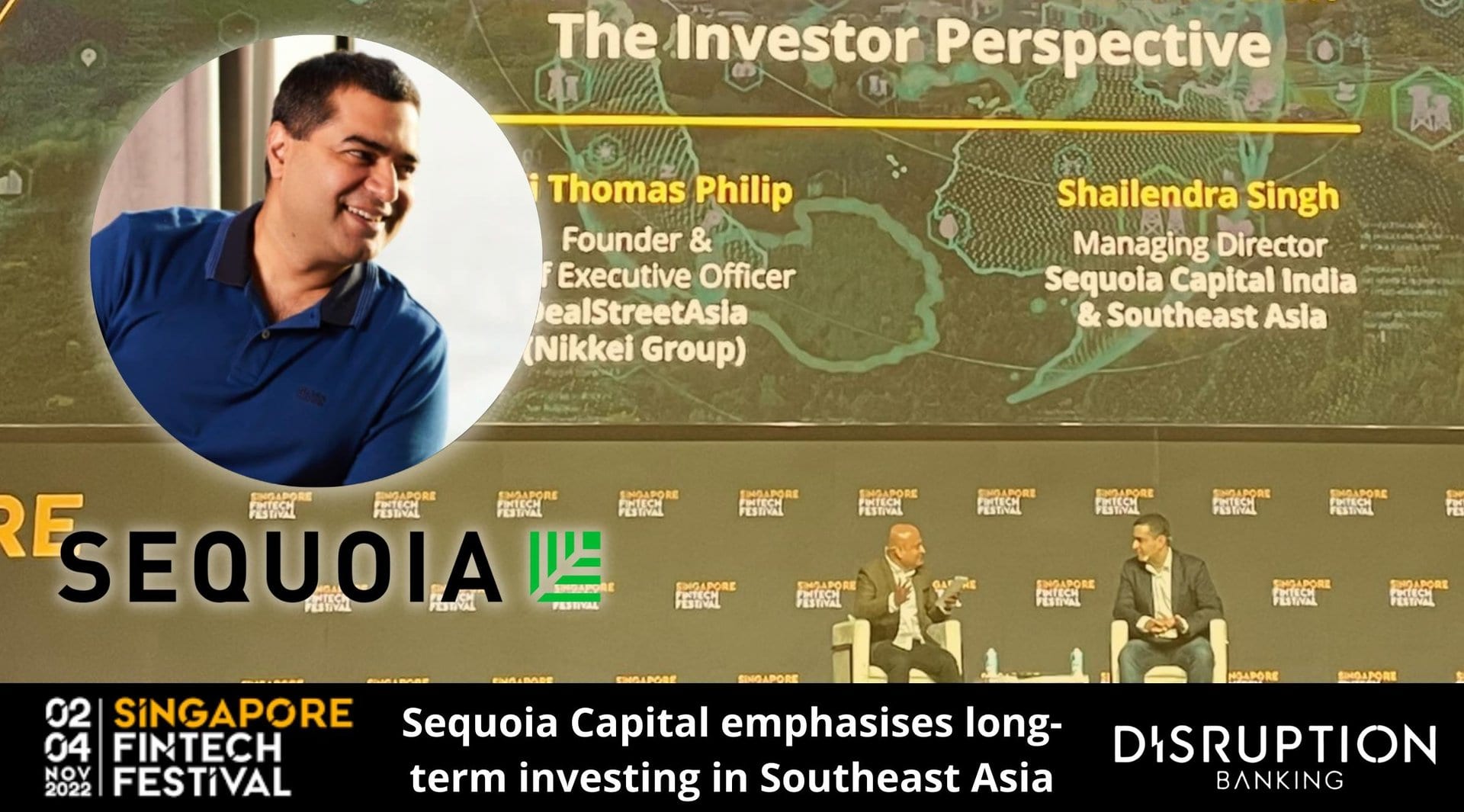2022 has been a difficult year for fintech leaders and start-up founders, and indeed businesses everywhere. Interest rates are rising and the era of cheap money is coming to an end. Inflation is on the rise, putting further pressure on profit margins. Supply chains are being disrupted. After the record funding year of 2021, which saw fintechs reach sky-high valuations, investors are now starting to refocus on first principles and fundamentals. That was the message Shailendra Singh, Managing Director of Sequoia Capital in India and Southeast Asia, brought to the Singapore Fintech Festival.
Shailendra Singh from Sequoia Capital takes to the stage at #SFF2022. Resilience is ‘market cycle agnostic’, but when markets go south it’s natural that the idea of ‘resilience’ becomes the focus. pic.twitter.com/IYUlLQGESe
— #DisruptionBanking (@DisruptionBank) November 3, 2022
Singh argued that there’s often a “tension” within fintech companies – “between the fin and the tech.” Tech companies are often built with the primary aim to achieve a very high market share as quickly as possible, a tactic called “Blitzscaling.” This approach prioritises growth and user acquisition over profit margins. But financial services companies are built in a way that is, in Singh’s words, “completely different.” Naturally, finance firms are more “economically prudent and frugal,” preferring to opt for a longer-term strategy of “disciplined compounding” rather than short-term Blitzscaling. Current market conditions are likely to see the “fin” mentality win the day.
Indeed, Singh emphasised that Sequoia is always prepared to be patient in its investments. Particularly in emerging markets in Southeast Asia, where fintechs could potentially provide banking services to hundreds of millions of unbanked consumers, Singh believes we could see some current companies “become amongst the most valuable companies in these economies – but it will take decades.” He thinks “scaling” is the key and that investors should take a “patient, very long-term, multi-decade view [to help] build very large companies.” When this approach is adopted, short-term market conditions are largely irrelevant.
On this basis, Singh argued that “Blitzscaling is overrated and compounding is underrated.” Human psychology is such that most aim for “quick wins,” with markets especially constantly focused just on the next quarter. He said that current tech valuations in the United States represent a “generational buying opportunity,” but nobody’s really investing in the space because valuations have declined since last year – with short-term thinking driving decisions.
Blitzscaling is overrated in FinTech and consistent compounding is underrated. The FinTech opportunity will go on for decades, we’re not even close to saturation. We'll see secular compounding in lots of FinTech models many years down the line. @singh_sequoia @sgfintechfest #SFF pic.twitter.com/rvVjoglhrL
— Sequoia India & Southeast Asia (@SequoiaIndiaSEA) November 3, 2022
Singh cited legendary investor Warren Buffet, who also seeks to build “extremely long-term positions,” as do most of the best-performing venture capital firms. “They’ll be like, hey, current market volatility, this is just noise,” Singh said. He added that because last year saw record amounts of funding and record valuations, there was a “human psychology-induced euphoria.” This year, “very predictably, you’re seeing the completely opposite behaviour.”
Because of current conditions – which involve the winding down of “a decade plus of record liquidity and extraordinarily large investment in tech” – Singh believes many start-ups will have to tighten their belts. He recalled a company he worked with last year, which had a monthly turnover of just $6000, managing to raise $35 million in funding. This era of free money is over. But Singh believes this isn’t necessarily a bad thing. He thinks that it’s now “taken for granted” that companies should build with huge capital injections, but that actually it can be done a lot more “frugally.” It could even be an opportunity for founders to build their companies without having investors dilute their ownership.
Singh warned that founders shouldn’t “embrace false thinking.”
“I think of all these large valuations and large raises, proxies for success, makes founders feel good,” he said. “It’s a dopamine hit; I got $50 million or $75 million, just nine months after starting my company.” But just securing large amounts of funding isn’t how companies succeed or progress.
Singh believes that the current market difficulties will encourage investors and start-up founders to get back to basics. There is likely to be a renewed emphasis on revenue growth and profitability, rather than funding rounds and user acquisition. In Sequoia’s opinion, this is the route to long-term growth and success. They’ll certainly be deploying a long-term view as they decide where to deploy capital in difficult market conditions.
Author: Harry Clynch
#SFF2022 #Sequoia #VentureCapital #Fintech

















